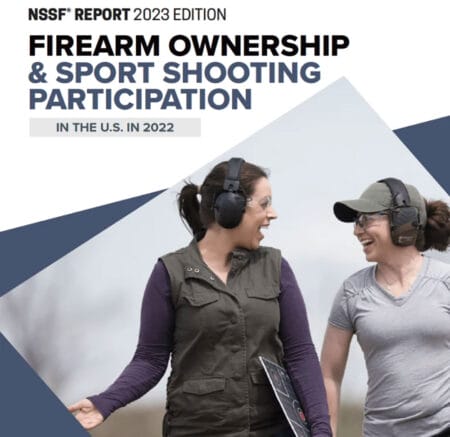Opinion
By Shelby Baird Smith

The U.S. Supreme Court’s 2023 Term has been a triumph for reining in executive overreach. It is no secret that the Biden administration has used its executive agencies—and for our industry Bureau of Alcohol, Tobacco, Firearms and Explosives (ATF) in particular—to circumvent the will of Congress to enact its radical antigun agenda. But recent Supreme Court decisions curtailing the power of the “administrative state” are important steps in righting the ship and restoring the constitutional separation of powers to those envisioned by the Founders.
First, the Supreme Court held in Garland v. Cargill that the ATF exceeded its statutory authority by classifying semiautomatic rifles equipped with bump stocks as “machineguns” under the National Firearms Act of 1934 (NFA). In doing so, the Court made clear that ATF could not ignore the statutory text of the law. Rather, the agency must follow Congress’s clear statutory mandate and cannot read in its own policy preferences.
More recently, the Court put a stop to the practice of deferring to an administrative agency’s interpretation of the law, also known as the Chevron doctrine. That doctrine stemmed from a 1984 case called Chevron v. Natural Resources Defense Council, in which the Supreme Court created a two-part test for determining if an executive agency has acted within its statutory authority in interpreting the law it administers. Under that test, courts first considered whether the statute gave a clear answer to the question in the case. If the court found that the statute was silent or ambiguous as to the issue at hand, then it would defer to the agency’s interpretation of the statute if it was “reasonable,” even if the court did not think it the best reading of the statute. In practicality, courts would routinely defer to the agency’s interpretations, which gave administrative agencies a wide latitude to regulate untold aspects of American enterprise and everyday life by interpreting the law to fit their policy preferences even when it was contrary to the will of Congress.
While the Supreme Court declined to apply Chevron deference for nearly a decade, it officially overruled the precedent in Loper Bright Enterprises v. Raimondo and Relentless, Inc. v. Department of Commerce. Those cases challenged a National Marine Fisheries Service rule that required commercial fishing boats to pay for government monitors that keep watch over crews for overfishing violations. The challengers argued that the relevant statute did not authorize the agency to mandate that fishing boats pay for the government monitors. Two federal appellate courts applied the Chevron doctrine and upheld the rule, deferring to the agency’s interpretation.
Chevron Overruled
In a 6-3 decision authored by Chief Justice John Roberts, the Supreme Court held that Chevron deference to an agency’s interpretation of the law is inconsistent with the Administrative Procedure Act (APA), which requires that courts – not agencies – exercise their own independent judgment in determining what the law means and deciding whether an agency has acted within its statutory authority. The Court rejected the notion that agency interpretations are entitled to deference based on technical expertise. Rather, it is the courts that have special competence in interpreting ambiguous statutes and, if Congress and the Executive Branch disagree with how courts have interpreted the law, they can act by amending the statute. Finally, the Court rebuffed the argument that leaving the interpretation of ambiguous statutes to courts – rather than agencies – amounts to “policymaking suited for political actors.” That view misunderstands the judicial role, as the APA has always required that courts determine what powers Congress has delegated to agencies and to police those boundaries to ensure that agencies do not go beyond their statutory authority.
Rebalancing the Scales
The Loper Bright decision will send shock waves in administrative law, as Chevron deference tipped the scales in the favor of agency interpretations for decades. Courts faced with textual ambiguities or silence can no longer reflexively rule in favor of an agency by declaring that its interpretation of a statute is reasonable. By overruling Chevron, the Supreme Court rebalances the scales by restoring the proper roles of the judicial, executive, and legislative branches. Congress makes the law; the executive enforces the law; and the courts interpret the law.
Limitations on the encroachment on each branch’s power are critical to the separation of powers in our constitutional system. The Loper Bright decision makes a large leap in the right direction for curtailing administrative overreach. Like many agencies as of late, the ATF has brazenly exceeded its authority through several actions, including its aforementioned reclassification of bump stocks as machineguns, its Final Rule banning stabilizing braces for AR-15 pistols, its Final Rule redefining when something is a “frame or receiver“ and its Final Rule redefining what it means to be “engaged in the business” of dealing in firearms.
While overruling Chevron does not provide a silver bullet for stopping the agency’s abuses, it takes away an important tool in its arsenal, as the ATF is no longer entitled to deference on its whipsawing, ever-changing statutory interpretations crafted to bypass Congress. Rather, both Cargill and Loper Bright send a clear message: the age of administrative excess is over, and agencies should leave legislating to Congress and interpreting the law to the courts.
About The National Shooting Sports Foundation
NSSF is the trade association for the firearm industry. Its mission is to promote, protect and preserve hunting and shooting sports. Formed in 1961, NSSF has a membership of thousands of manufacturers, distributors, firearm retailers, shooting ranges, sportsmen’s organizations, and publishers nationwide. For more information, visit nssf.org








The ink isn’t even dry on the Chevron Ruling and yet; “The ATF rules for sales of certain types of semi-automatic rifles in California, New Mexico, Arizona, and Texas due to their proximity to the southwest border.” I wrote this on another site but am copy and pasting it here. “It’s obvious they are not going to defer to Chevron Deference. Basically, 80-90% of all gun control acts became UnConstitutional the minute that ruling was handed down. The Supreme Court needed to go one step further and call it exactly what it is; “A Title of Nobility,”, handed to agencies… Read more »
Greg, you are absolutely right, in my opinion. ATF is going to keep pushing these BS regulations until their traitorous leadership starts doing some hard time for treason. It’s time to disband this rogue outfit.
But in this case the law specifically authorizes the AG to direct licensees to file these reports. The only out would be if the directive came from someone other than Garland. The question then becomes whether he is authorized to designate someone farther down the food change to issue the requirement.
That’s exactly what The Chevron ruling just struck down. Virtually every paragraph in Title 18, SS923 has a statement where the AG is Authorized by REGULATION. It’s not up to the AG to make punitive regulations via Constitution, it’s Congresses duty, so that we have sway over our ELECTED Representatives. Here’s the thing, they have been putting this delegation language in every statute for about 80 years now. Go read about Wickard V. Filburn…it’s the first time deference occurred due to experts having a better grasp on the situation. In other words Congress giving Authority to Agency is exactly what… Read more »
No, 18 U.S. Code § 923(g)(5)(A) has nothing to do with regulations, it is the law. Unambiguous law. Chevron and Loper Bright were about regulations, agency interpretations of the law, and leeway given to the agency’s interpretations. This recent action is largely meaningless because it only deals with manufacturers and importers selling directly to the end user. The directive for FFLs to report has been going on for years. Both suck but it is per the law, not made up regulation.
You cited it, but did you read it? Am starting at (g)(1)(a) It’s the start of the record keeping “as the Attorney General may prescribe by regulation” This is sewn all through the GCA However the very (g)(5)(a) you cited; It’s ambiguous in that it double talks and gives the Authority to the Attorney General to Make an action and stop said action only when the ATTORNEY GENERAL sees fit. Because several paragraphs leading up to this particular statute have the Attorney General shall prescribe regulations clause, it sets up ambiguous or may be capricious openings for the Attorney General… Read more »
will those who have been abused by atf and the other agencies be eligible for restitution? can charges be brought to the agents who broke the law? what about civil court justice?
Surely you jest.
It is amazing to me that the liberals hate the SCOTUS for following the Constitution. They are fine with tearing up the Constitution if it gets in their way, but let the court put thing right and they loose what little mind they have! Shameful and very, VERY un-American!
Based on the vote and the ignorant comments by liberal justices after the immunity ruling, you know they are drafting cases they will take up once the court goes liberal again. I pray it does not happen in my lifetime or the lifetime of my children. Those bastards will reinstate Rowe, chevron deference and probably limit immunity if the president at the time is a conservative! Their ignorance about the law and our Constitution is remarkably shocking, but you get what you voted for!!!!
It’s a game and only the privileged can play. As soon as SCOTUS publishes their decisions,(maybe sooner) the legislators (state or federal) have a new way to achieve whatever the courts have dismissed. “Emergency meetings” are scheduled before the decisions are even released. The game is fixed and not in our favor. It doesn’t look good for the honest citizen any more.